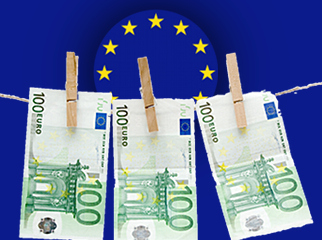 The arguments voiced by online gambling opponents traditionally take one of two tacks: it’s either a moral scourge designed to lure impressionable youth into a life of degradation and depravity or a money laundering tool utilized by mafia types or digitally-savvy jihadis looking to fund their next terror plot. Just this December, infamous anti-gambling campaigner John W. Kindt (the ‘W’ is for ‘wack’) claimed the online poker bill cooked up by Senate majority leader Harry Reid would make it “easier for mobsters and even terrorists to launder money.” (Kindt also claimed that online gambling would bring down the global economy.)
The arguments voiced by online gambling opponents traditionally take one of two tacks: it’s either a moral scourge designed to lure impressionable youth into a life of degradation and depravity or a money laundering tool utilized by mafia types or digitally-savvy jihadis looking to fund their next terror plot. Just this December, infamous anti-gambling campaigner John W. Kindt (the ‘W’ is for ‘wack’) claimed the online poker bill cooked up by Senate majority leader Harry Reid would make it “easier for mobsters and even terrorists to launder money.” (Kindt also claimed that online gambling would bring down the global economy.)
Such hyperbolic views are easy to dismiss when they come from nutters like Kindt, but it’s less of a joke when politicians holding the reins of power start accepting Kindt’s kind of blarney as gospel truth. Last year, European Union politicians were told that online gambling was the “perfect tool” for money laundering. This February, the European Commission proposed putting further restrictions on online gambling to monitor transactions for suspicious activities, with penalties of up to €5m for companies that failed to comply with these directives.
With all due respect to the EU and the Financial Action Task Force, this is a solution in search of a problem. Members of the European Parliament (MEP) attended a workshop in Brussels last month at which Professor Friedrich Georg Schneider, an economist at the Johannes Kepler University of Linz, Austria, presented evidence that all gambling – land-based and online – accounted for a mere 0.5% of total money laundering activity. Schneider singled out online poker as a particularly ineffective method of laundering money, in no small part due to the high transaction costs.
Schneider quoted a study of the German gambling market by consultancy Goldmedia that concluded that even if the entire online poker market was utilized solely for money laundering purposes, the total amount processed would represent just 3.2% of the estimated total sum generated by all criminal activity in Germany. Schneider said his research had led him to conclude that online poker was “by no means relevant for money laundering.”
At the same meeting, Sven Stiel, Director Northern Europe for PokerStars’ parent company Rational Group, stated that the relatively small sums involved in online poker transactions “have no relevance with regard to money laundering.” Stiel also noted that since online gambling is a non-cash business, most of the money that flows into the site has already been handled (and presumably vetted) by the banking system. When MEP Jürgen Creutzmann tried to throw Stiel by asking him about anonymous payment methods, Stiel noted that prepaid cards can only be loaded with minimal sums, usually a maximum of €100 to €150, and the use of these cards requires players to log in via their individual accounts, making them easily identifiable.
It’s anybody’s guess whether the European politicians who participated in the workshop came away with a new appreciation for the implausibility of the online gambling/money laundering trope. Politicians around the globe have trotted out the money laundering boogeyman so often that to do an about-face now would leave them open to charges of flip-flopping and/or make them easy targets for those who cling to the conventional wisdom, regardless of how factually devoid that ‘wisdom’ may be.
